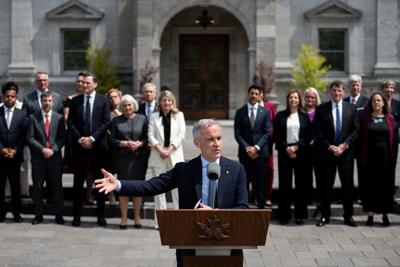When the boss promotes you, trusts you with a new, important file, itŌĆÖs a good idea to stay on message. Reinforce the mandate. Show people why you deserved the nod.
Those are the dictates of received wisdom.
But then there is the inconvenience of reality.
Earlier this week, Gregor Robertson, the newly minted Housing Minister, told reporters housing prices should go down. Not to be outdone, Steven Guilbeault explained to Western Canada that the country more pipelines right now. Both, predictably, drew media attention and public ire.
But the real and enduring problem for Prime Minister Mark Carney is not just that these statements directly contradict promises he made on the campaign trail ŌĆö to bring down home prices and build greater energy infrastructure. Nor is it that, in this case, the political ŌĆ£rookie mistakeŌĆØ card is unplayable. Robertson was Mayor of Vancouver for a decade. Guilbeault is a cabinet veteran, and no stranger to statements that inflame Western Canada and its energy sector.
The real, more insidious issue for the Prime Minister is what these statements represent: the temptation to be distracted from the very mission that got them elected in the first place.
ThereŌĆÖs a classic axiom in politics: most failures arenŌĆÖt assassinations ŌĆö theyŌĆÖre suicides.
And the weeks and months that follow an election are when governments are most prone to scoring on their own net. These are the kind of self-inflicted mistakes that drain a governmentŌĆÖs credibility. The kind that comes back to bite you the next time voters head to the polls.
But crucially, these missteps almost always stem from the same source: a fundamental misreading of why you were elected ŌĆö and what voters expected you to deliver.
ItŌĆÖs a strange and dangerous irony of politics that just when your mandate should be at its sharpest ŌĆö fresh off a campaign ŌĆö the temptation to misinterpret it is at its peak. The tunnel vision of the election clears and suddenly ministers begin seeing their new roles not as extensions of the public will, but as blank canvases for their personal agendas.
It is the leaderŌĆÖs job ŌĆö above all ŌĆö to arrest that drift. To enforce clarity. To instill message discipline. And to continually remind every member of their cabinet and caucus why theyŌĆÖre sitting on the government side of the House of Commons ŌĆö and not wandering in the political wilderness.
In this election, Canadian voters were exceptionally clear on what they wanted: Mark Carney to take on Donald Trump. A decisive turn from the Trudeau years. Real answers on productivity, competitiveness, and growth.
For the new Prime Minister, the assignment couldnŌĆÖt be clearer ŌĆö or less forgiving. Because Canadian voters have left no margin for error. This is a relatively thin mandate. And to preserve it, Carney must not only stick to the plan ŌĆö but communicate an unrelenting focus on delivering it.
So, hereŌĆÖs the bottom line. The biggest risk to Carney isnŌĆÖt the opposition benches ŌĆö itŌĆÖs the risk of losing the plot. ItŌĆÖs misunderstanding the very assignment he was elected to complete. Of forgetting, too soon, what voters actually asked for.
A lot of commentators have described the challenge of this government as a balancing act. But thatŌĆÖs the wrong metaphor ŌĆö because itŌĆÖs the wrong message.
For Carney, this is no time for finesse. Voters didnŌĆÖt ask for acrobatics ŌĆö they asked for action.
ThatŌĆÖs the test in the short term and thatŌĆÖs the test that will define him the next time Canadians cast their votes.




























To join the conversation set a first and last name in your user profile.
Sign in or register for free to join the Conversation